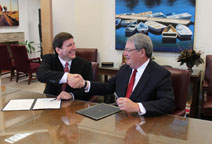
As we count down to the new year, we thought we’d share some of the SUNY news you may have missed during 2012.
SUNY celebrated a big milestone in September – within the first year of the shared services initiative, SUNY campuses were able to redirect more than $6 million from administrative spending to academic instruction and student support services. Of that total, $2.5 million came from the administrative pairs – Cobleskill and Delhi, Morrisville and SUNYIT, and Canton and Potsdam.
“The SUNY campuses have made remarkable progress in this inaugural year of our shared services initiative – truly realizing the capacity of SUNY’s systemness by sharing the costs associated with administrative salaries, IT functions, procurement, and more – and freeing up funds for what matters most, our students,” said Chancellor Zimpher.
“This is just the beginning as we continue to review where and how we can streamline our administrative costs and share best practices across SUNY. I thank the leadership at each campus for their dedication and diligence, and commend them for their collective efforts.”
So, how did they do it? Since last August, all SUNY campuses have worked to identify and eliminate redundant administrative services and to collaborate on business, finance, and procurement operations. Campuses have also increased opportunities to share best practices and enhance program offerings.
Some of the unique ways the campuses aligned to achieve this goal include:
- Alfred State College will begin providing SUNY Fredonia and SUNY Geneseo with printing services for letterhead and envelopes, and SUNY is exploring replicating the partnership through a SUNY-wide Print Shop Utilization Project that will examine print shop capabilities university-wide, with the goal of consolidating resources and expenditures with a few key regional print shops.
- Clinton Community College and SUNY Plattsburgh signed a Memorandum of Understanding to share services in several areas, including a food service program for students, bookstore, academic programs, a conditional acceptance program for domestic and international students, and curricular development.
- SUNY Delhi and SUNY Cobleskill have identified more than $700,000 in administrative savings thus far, predominantly by establishing a joint cabinet, including a shared president and vice presidents for advancement, college relations, business and finance, and operations. The campuses have also hired a shared culinary faculty member and are sharing an assistant vice president for enrollment management and director of research and sponsored programs.
- SUNY Oneonta negotiated a shared contract with SUNY Delhi and SUNY Cobleskill, with Medicat, a leading provider of healthcare information technology for colleges and universities.
- SUNY Canton and SUNY Potsdam have hired two shared administrators in the past year, joint Chief Financial Officer Natalie Higley and joint Veterans Affairs Officer Patrick Massaro. The two campuses are currently working together to fill a joint interlibrary loan position.
- The SUNY Potsdam Department of Geology and the SUNY Canton Department of Environmental Technology will offer minors to students at both campuses in Geology and Environmental Technology, filling a need at both campuses and enriching opportunity for students.
- First-year restructuring at MSC and SUNYIT will yield net savings and a reallocation of administrative to academic resources in the amount of $297,000 at MSC and $376,000 at SUNYIT.
- In Western New York, nearly 40 pairs or groups of administrative counterparts at the University at Buffalo and Buffalo State have met to generate ideas for shared services, resulting in nearly 100 new ideas, such as shared software contracts, library storage, fiber optic Internet access, training opportunities, and policy and procedure development.
The funds redirected from these initiatives have already allowed for the hiring of more than 30 new faculty members in the administrative pair institutions alone; new financial aid programs including tuition credits and scholarships; career development programs and staffing; tutoring and academic advisement; and new academic and instructional equipment.

